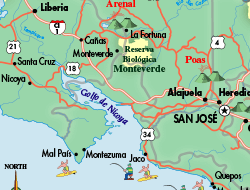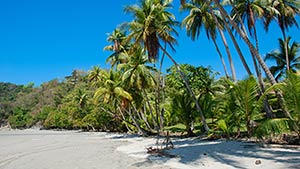What is Sustainable Tourism?
Guide at Monteverde Reserve talking about the forest
Sustainable tourism is both ecologically and culturally sensitive. While helping to generate income and employment, it attempts to make a low impact on a country’s environment, its local culture and aids in the preservation of the local ecosystems.
Impact of Tourism
It embraces the tourism industry, seeking to reduce its environmental impacts and contributing to the conservation process. In its purest sense, sustainable tourism allows tourists to travel to natural destinations, builds environmental awareness, provides financial benefits and minimizes the impact of tourism while at the same time respecting local culture and empowering the local people.
Community Beneficts
This kind of tourism is not necessarily ecotourism, which exclusively focuses on nature and wildlife. Sustainable tourism helps conserve resources with its main aim being – environmental integrity, economic expansion and social justice. Avoiding damage to the environment, culture and the local economy of the destinations, it encompasses the environmental, economic and socio-cultural aspects of the tourism industry. It aims at a responsible kind of tourism that ensures a positive experience for the tourists and the local people, while building a strong partnership between tourism companies and the local government. The major advantage of sustainable tourism includes greater community benefits and far reaching impacts. One of the sound practices that sustainable tourism promotes is the management of tourist destinations by the community itself. Management and planning not only helps lessen the impact but also ensures investment in this industry for supporting sustainability. This allows the local businesses and the community to develop and operate the tourism activities, supporting the conservation message and protecting the environment.
Responsible Tourism
The stakeholders of sustainable tourism are mainly the non-governmental organizations and the local community. These stakeholders play a continuing role in advocating responsible tourism. The non-profit organizations play an active role in the conservation of the natural environment of any country. This ranges from research, planning to spearhead the responsible tourism practices itself. The development pressures are then anticipated and management techniques are applied to sustain the natural habitats and the scenic heritage along with the local culture of a destination. Sensitive to the dangers of sustainable tourism, tourists promoting this industry are seeking to protect the natural surroundings and destinations. Responsible tourism has helped reduce the impact of tourism on the environment as a whole. That is why tourism operators and destinations worldwide are now endorsing ‘sustainable tourism’ as a conscientious path towards responsible tourism.
7 Days / 6 Nights
Starting at $978 per person
10 Days / 9 Nights
Starting at $1,440 per person









.jpg)

.jpg)
.jpg)



.jpg)

